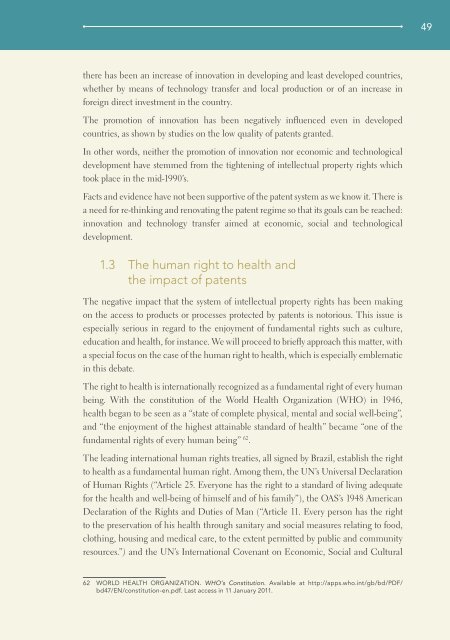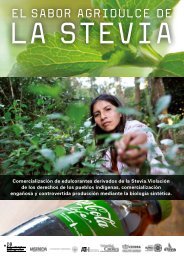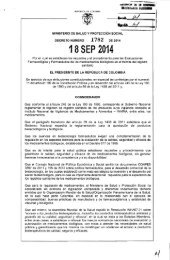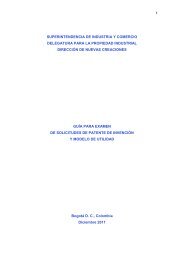- Page 1 and 2: Center for Strategic Studies and De
- Page 3 and 4: Chamber of Deputies 54th Legislatur
- Page 5 and 6: Center for Strategic Studies and De
- Page 7 and 8: CONTENTS Introduction by the Presid
- Page 9 and 10: 8.2 Restriction to patent applicati
- Page 11 and 12: 10 Estudos Estratégicos brazil's p
- Page 13 and 14: 12 Estudos Estratégicos brazil's p
- Page 15 and 16: 14 Estudos Estratégicos brazil's p
- Page 17 and 18: 16 Estudos Estratégicos brazil's p
- Page 19 and 20: 18 Estudos Estratégicos brazil's p
- Page 21 and 22: 20 Estudos Estratégicos brazil's p
- Page 23 and 24: 22 Estudos Estratégicos brazil's p
- Page 25 and 26: 24 Estudos Estratégicos brazil's p
- Page 27 and 28: 26 Estudos Estratégicos brazil's p
- Page 29 and 30: 28 Estudos Estratégicos brazil's p
- Page 31 and 32: 30 Estudos Estratégicos brazil's p
- Page 33 and 34: 32 Estudos Estratégicos brazil's p
- Page 35 and 36: 34 Estudos Estratégicos brazil's p
- Page 37 and 38: 36 Estudos Estratégicos brazil's p
- Page 39 and 40: 38 Estudos Estratégicos brazil's p
- Page 41 and 42: 40 Estudos Estratégicos brazil's p
- Page 43 and 44: 42 Estudos Estratégicos brazil's p
- Page 45 and 46: 44 Estudos Estratégicos brazil's p
- Page 47 and 48: 46 Estudos Estratégicos brazil's p
- Page 49: 48 Estudos Estratégicos brazil's p
- Page 53 and 54: 52 Estudos Estratégicos brazil's p
- Page 55 and 56: 54 Estudos Estratégicos brazil's p
- Page 57 and 58: 56 Estudos Estratégicos brazil's p
- Page 59 and 60: 58 Estudos Estratégicos brazil's p
- Page 61 and 62: 60 Estudos Estratégicos brazil's p
- Page 63 and 64: 62 Estudos Estratégicos brazil's p
- Page 65 and 66: 64 Estudos Estratégicos brazil's p
- Page 67 and 68: 66 Estudos Estratégicos brazil's p
- Page 69 and 70: 68 Estudos Estratégicos brazil's p
- Page 71 and 72: 70 Estudos Estratégicos brazil's p
- Page 73 and 74: 72 Estudos Estratégicos brazil's p
- Page 75 and 76: 74 Estudos Estratégicos brazil's p
- Page 77 and 78: 76 Estudos Estratégicos brazil's p
- Page 79 and 80: 78 Estudos Estratégicos brazil's p
- Page 81 and 82: 80 Estudos Estratégicos brazil's p
- Page 83 and 84: 82 Estudos Estratégicos brazil's p
- Page 85 and 86: 84 Estudos Estratégicos brazil's p
- Page 87 and 88: 86 Estudos Estratégicos brazil's p
- Page 89 and 90: 88 Estudos Estratégicos brazil's p
- Page 91 and 92: 90 Estudos Estratégicos brazil's p
- Page 93 and 94: 92 Estudos Estratégicos brazil's p
- Page 95 and 96: 94 Estudos Estratégicos brazil's p
- Page 97 and 98: 96 Estudos Estratégicos brazil's p
- Page 99 and 100: 98 Estudos Estratégicos brazil's p
- Page 101 and 102:
100 Estudos Estratégicos brazil's
- Page 103 and 104:
102 Estudos Estratégicos brazil's
- Page 105 and 106:
104 Estudos Estratégicos brazil's
- Page 107 and 108:
106 Estudos Estratégicos brazil's
- Page 109 and 110:
108 Estudos Estratégicos brazil's
- Page 111 and 112:
110 Estudos Estratégicos brazil's
- Page 113 and 114:
112 Estudos Estratégicos brazil's
- Page 115 and 116:
114 Estudos Estratégicos brazil's
- Page 117 and 118:
116 Estudos Estratégicos brazil's
- Page 119 and 120:
118 Estudos Estratégicos brazil's
- Page 121 and 122:
120 Estudos Estratégicos brazil's
- Page 123 and 124:
122 Estudos Estratégicos brazil's
- Page 125 and 126:
124 Estudos Estratégicos brazil's
- Page 127 and 128:
126 Estudos Estratégicos brazil's
- Page 129 and 130:
128 Estudos Estratégicos brazil's
- Page 131 and 132:
130 Estudos Estratégicos brazil's
- Page 133 and 134:
132 Estudos Estratégicos brazil's
- Page 135 and 136:
134 Estudos Estratégicos brazil's
- Page 137 and 138:
136 Estudos Estratégicos brazil's
- Page 139 and 140:
138 Estudos Estratégicos brazil's
- Page 141 and 142:
140 Estudos Estratégicos brazil's
- Page 143 and 144:
142 Estudos Estratégicos brazil's
- Page 145 and 146:
144 Estudos Estratégicos brazil's
- Page 147 and 148:
146 Estudos Estratégicos brazil's
- Page 149 and 150:
148 Estudos Estratégicos brazil's
- Page 151 and 152:
150 Estudos Estratégicos brazil's
- Page 153 and 154:
152 Estudos Estratégicos brazil's
- Page 155 and 156:
154 Estudos Estratégicos brazil's
- Page 157 and 158:
156 Estudos Estratégicos brazil's
- Page 159 and 160:
158 Estudos Estratégicos brazil's
- Page 161 and 162:
160 Estudos Estratégicos brazil's
- Page 163 and 164:
162 Estudos Estratégicos brazil's
- Page 165 and 166:
164 Estudos Estratégicos brazil's
- Page 167 and 168:
166 Estudos Estratégicos brazil's
- Page 169 and 170:
168 Estudos Estratégicos brazil's
- Page 171 and 172:
170 Estudos Estratégicos brazil's
- Page 173 and 174:
172 Estudos Estratégicos brazil's
- Page 175 and 176:
174 Estudos Estratégicos brazil's
- Page 177 and 178:
176 Estudos Estratégicos brazil's
- Page 179 and 180:
178 Estudos Estratégicos brazil's
- Page 181 and 182:
180 Estudos Estratégicos brazil's
- Page 183 and 184:
182 Estudos Estratégicos brazil's
- Page 185 and 186:
184 Estudos Estratégicos brazil's
- Page 187 and 188:
186 Estudos Estratégicos brazil's
- Page 189 and 190:
188 Estudos Estratégicos brazil's
- Page 191 and 192:
190 Estudos Estratégicos brazil's
- Page 193 and 194:
192 Estudos Estratégicos brazil's
- Page 195 and 196:
194 Estudos Estratégicos brazil's
- Page 197 and 198:
196 Estudos Estratégicos brazil's
- Page 199 and 200:
198 Estudos Estratégicos brazil's
- Page 201 and 202:
200 Estudos Estratégicos brazil's
- Page 203 and 204:
202 Estudos Estratégicos brazil's
- Page 205 and 206:
204 Estudos Estratégicos brazil's
- Page 207 and 208:
206 Estudos Estratégicos brazil's
- Page 209 and 210:
208 Estudos Estratégicos brazil's
- Page 211 and 212:
210 Estudos Estratégicos brazil's
- Page 213 and 214:
212 Estudos Estratégicos brazil's
- Page 215 and 216:
214 Estudos Estratégicos brazil's
- Page 217 and 218:
216 Estudos Estratégicos brazil's
- Page 219 and 220:
218 Estudos Estratégicos brazil's
- Page 221 and 222:
220 Estudos Estratégicos brazil's
- Page 223 and 224:
222 Estudos Estratégicos brazil's
- Page 225 and 226:
224 Estudos Estratégicos brazil's
- Page 227 and 228:
226 Estudos Estratégicos brazil's
- Page 229 and 230:
228 Estudos Estratégicos brazil's
- Page 231 and 232:
230 Estudos Estratégicos brazil's
- Page 233 and 234:
232 Estudos Estratégicos brazil's
- Page 235 and 236:
234 Estudos Estratégicos brazil's
- Page 237 and 238:
236 Estudos Estratégicos brazil's
- Page 239 and 240:
238 Estudos Estratégicos brazil's
- Page 241 and 242:
240 Estudos Estratégicos brazil's
- Page 243 and 244:
242 Estudos Estratégicos brazil's
- Page 245 and 246:
244 Estudos Estratégicos brazil's
- Page 247 and 248:
246 Estudos Estratégicos brazil's
- Page 249 and 250:
248 Estudos Estratégicos brazil's
- Page 251 and 252:
250 Estudos Estratégicos brazil's
- Page 253 and 254:
252 Estudos Estratégicos brazil's
- Page 255 and 256:
254 Estudos Estratégicos brazil's
- Page 257 and 258:
256 Estudos Estratégicos brazil's
- Page 259 and 260:
258 Estudos Estratégicos brazil's
- Page 261 and 262:
260 Estudos Estratégicos brazil's
- Page 263 and 264:
262 Estudos Estratégicos brazil's
- Page 265 and 266:
264 Estudos Estratégicos brazil's
- Page 267 and 268:
266 Estudos Estratégicos brazil's
- Page 269 and 270:
268 Estudos Estratégicos brazil's
- Page 271 and 272:
270 Estudos Estratégicos brazil's
- Page 273 and 274:
272 Estudos Estratégicos brazil's
- Page 275 and 276:
274 Estudos Estratégicos brazil's
- Page 277 and 278:
276 Estudos Estratégicos brazil's
- Page 279 and 280:
278 Estudos Estratégicos brazil's
- Page 281 and 282:
280 Estudos Estratégicos brazil's
- Page 283 and 284:
282 Estudos Estratégicos brazil's
- Page 285 and 286:
284 Estudos Estratégicos brazil's
- Page 287 and 288:
286 Estudos Estratégicos brazil's
- Page 289 and 290:
288 Estudos Estratégicos brazil's
- Page 291 and 292:
290 Estudos Estratégicos brazil's
- Page 293 and 294:
292 Estudos Estratégicos brazil's
- Page 295 and 296:
294 Estudos Estratégicos brazil's
- Page 297 and 298:
296 Estudos Estratégicos brazil's
- Page 299 and 300:
298 Estudos Estratégicos brazil's
- Page 301 and 302:
300 Estudos Estratégicos brazil's
- Page 303 and 304:
302 Estudos Estratégicos brazil's
- Page 305 and 306:
304 Estudos Estratégicos brazil's
- Page 307 and 308:
306 Estudos Estratégicos brazil's
- Page 309 and 310:
308 Estudos Estratégicos brazil's
- Page 311 and 312:
310 Estudos Estratégicos brazil's
- Page 313 and 314:
312 Estudos Estratégicos brazil's
- Page 315 and 316:
314 Estudos Estratégicos brazil's
- Page 317 and 318:
316 Estudos Estratégicos brazil's
- Page 319 and 320:
318 Estudos Estratégicos brazil's
- Page 321 and 322:
320 Estudos Estratégicos brazil's
- Page 323 and 324:
322 Estudos Estratégicos brazil's
- Page 325 and 326:
324 Estudos Estratégicos brazil's
- Page 327 and 328:
326 Estudos Estratégicos brazil's
- Page 329 and 330:
328 Estudos Estratégicos brazil's
- Page 331 and 332:
330 Estudos Estratégicos brazil's
- Page 333 and 334:
332 Estudos Estratégicos brazil's
- Page 335 and 336:
334 Estudos Estratégicos brazil's
- Page 337 and 338:
336 Estudos Estratégicos brazil's
- Page 339 and 340:
338 Estudos Estratégicos brazil's
- Page 341 and 342:
340 Estudos Estratégicos brazil's
- Page 343 and 344:
342 Estudos Estratégicos brazil's
- Page 345 and 346:
344 Estudos Estratégicos brazil's
- Page 347 and 348:
346 Estudos Estratégicos brazil's
- Page 349 and 350:
348 Estudos Estratégicos brazil's
- Page 351 and 352:
350 Estudos Estratégicos brazil's
- Page 353 and 354:
352 Estudos Estratégicos brazil's
- Page 355 and 356:
354 Estudos Estratégicos brazil's
- Page 357 and 358:
356 Estudos Estratégicos brazil's
- Page 359 and 360:
358 Estudos Estratégicos brazil's
- Page 361 and 362:
360 Estudos Estratégicos brazil's





